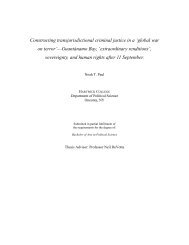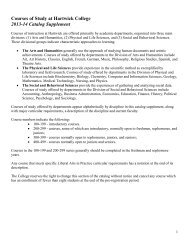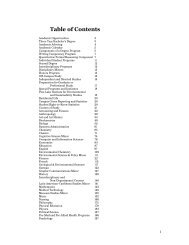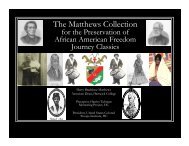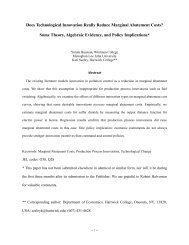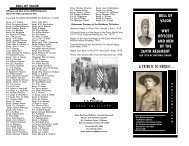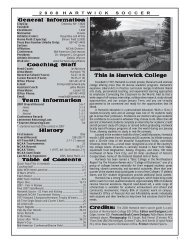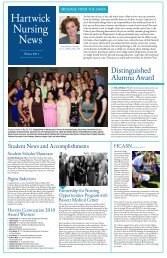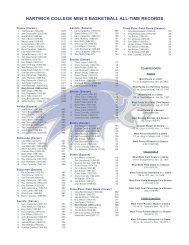Table of Contents - Hartwick College
Table of Contents - Hartwick College
Table of Contents - Hartwick College
You also want an ePaper? Increase the reach of your titles
YUMPU automatically turns print PDFs into web optimized ePapers that Google loves.
U.S. Ethnic Studies Minor<br />
This academic minor focuses on the comparative study <strong>of</strong> race and<br />
ethnicity in the United States as it uniquely intersects with the<br />
international context (with special emphasis on those groups that have<br />
historically borne the brunt <strong>of</strong> discrimination, enslavement and even<br />
extermination in the process <strong>of</strong> European expansion in the Americas).<br />
The comparative focus assumes that there are general processes that<br />
underlie the formation <strong>of</strong> ethnic identity and “race” relations in a wide<br />
range <strong>of</strong> social contexts. The program aims to expose students to the<br />
contributions <strong>of</strong> diverse groups <strong>of</strong> Americans to U.S. society and culture.<br />
To that end, the minor provides access to a range <strong>of</strong> analytical tools with<br />
which to examine the histories, experiences and cultures <strong>of</strong> America’s<br />
racial and ethnic groups and their relationships to each other and to the<br />
dominant culture. Interested students should contact Dr. Edythe Quinn.<br />
Objectives <strong>of</strong> the U.S. Ethnic Studies Minor are:<br />
1. To provide students with an understanding <strong>of</strong> the socially constructed<br />
“nature” <strong>of</strong> race and ethnicity.<br />
2. To help students understand the debates about the biological basis <strong>of</strong><br />
human diversity.<br />
3. To teach the histories, cultures and contributions <strong>of</strong> U.S. racial and<br />
ethnic groups in ways that highlight the differences and similarities <strong>of</strong><br />
ethnic experience and expression as well as the responses to racial/ethnic<br />
discrimination and its relationship to other historical inequalities such as<br />
class and gender.<br />
4. To help prepare students to participate in an increasingly diverse world<br />
and promote a more just society.<br />
5. To introduce the disciplinary scholarship <strong>of</strong> ethnic studies.<br />
6. To provide opportunities for students to experience racial and ethnic<br />
contexts that take them beyond their own cultural backgrounds.<br />
U.S. Ethnic Studies Minor<br />
Requirements for the minor in U.S. Ethnic Studies: Six courses,<br />
two <strong>of</strong> which are core to all students in the minor. No more than two<br />
courses in the student’s major field may count toward the minor. The core<br />
courses are the Introductory Course and the Capstone Seminar.<br />
Introductory Course (Theory/History) All students, regardless <strong>of</strong><br />
concentration, are required to take an introductory course on ethnicity<br />
which prepares them to look at the materials in their area <strong>of</strong><br />
concentration with reference to current theory in the study <strong>of</strong> ethnicity.<br />
Students are encouraged to take this course as early as possible and<br />
before completing the other requirements <strong>of</strong> the minor. Students may<br />
select as their introductory course one <strong>of</strong> the following courses:<br />
250 Hispanic and African-American Cultures (Anth)<br />
279 American Ethnic History (Hist)<br />
150 FYS: Politics <strong>of</strong> Race and Gender (Posc)<br />
250 Race and Ethnicity (Soci)<br />
250 Economics <strong>of</strong> Race and Gender (Econ)<br />
244



